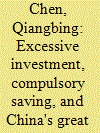| Srl | Item |
| 1 |
ID:
106921


|
|
|
|
|
| Publication |
2011.
|
| Summary/Abstract |
This paper investigates the roles of excessive investment and compulsory saving in causing China's great famine during the period of 1959-1961. China initiated its ambitious industrialization campaign in 1958 under the false illusion that the agricultural sector would be able to provide sufficient savings. When the illusion proved to be false, a large number of industrial projects were left incomplete. However, since the economic returns for completing the half-done projects were high, central planners maintained high levels of grain procurement and urban labor force to complete these projects, even when famine became widespread. In addition, some political factors also contributed to the insufficient response by the central planners to the famine. The high grain procurement enforced by the State, compounded by other factors such as weather calamity, caused the most deadly famine in human history.
|
|
|
|
|
|
|
|
|
|
|
|
|
|
|
|
| 2 |
ID:
090106


|
|
|
|
|
| Publication |
2009.
|
| Summary/Abstract |
The subprime mortgage crisis and the resultant inflationary monetary policy in the USA have left the Chinese economy subject to four risks in particular. First, China's exports to the USA might continue to decline. Second, in the medium term, the higher US inflation rate will lead to a weak dollar, which will negatively affect China's exports. Third, in the long term, when the US Federal Reserve decreases money supply to control inflation, the US economy might enter another recession, hurting China's exports further. Fourth, China's foreign exchange reserve assets might suffer heavy losses when the US inflation rate rises. Conventional foreign exchange investment strategies are insufficient for dealing with these four risks. Investment by China in the major US banks is suggested in the present paper. This strategy would mitigate if not eliminate all four risks. China could gain considerable financial returns on investments with only moderate risk.
|
|
|
|
|
|
|
|
|
|
|
|
|
|
|
|